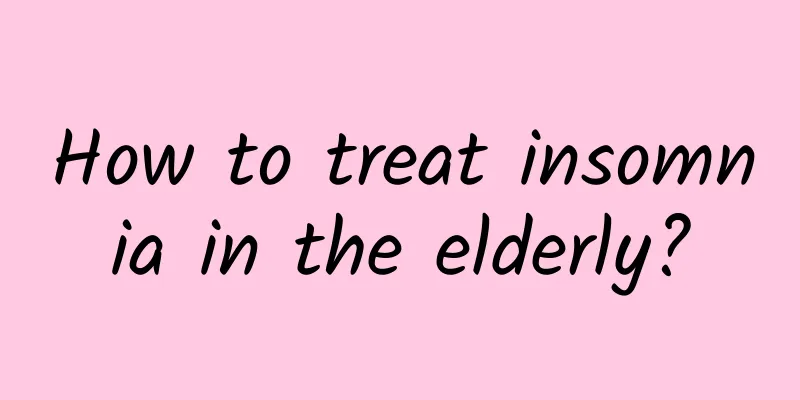How to treat insomnia in the elderly?

|
Baby-like sleep is the most desired sleep quality for the elderly. As the saying goes, the elderly are sleepy. In fact, many elderly people are not sleepy, but they are sleepy and can't fall asleep. This kind of pain in the quiet night troubles most elderly people. If you have the right opportunity and environment to sleep, but you still don't get enough sleep, feel restless, and it affects your daytime life, then you have to join the ranks of insomniacs. What is insomnia in the elderly The main symptoms of insomnia are: difficulty falling asleep (sleep latency exceeds 30 minutes), sleep maintenance disorder (awakening ≥ 2 times throughout the night), early awakening, early sleep, decreased sleep quality and reduced total sleep time (usually less than 6.5 hours), accompanied by daytime functional impairment, including daytime fatigue, depression or irritability, physical discomfort, cognitive impairment, etc. Insomnia is divided into short-term insomnia (course of disease <3 months) and chronic insomnia (course of disease ≥3 months). The prevalence of insomnia among the elderly is as high as 5%, and the lower the educational level, the higher the prevalence. According to statistics, the incidence of insomnia in people over 65 years old is 20% to 50%, with women being higher than men. Why do the elderly suffer from insomnia all night? 1. Physiological reasons Degenerative changes in the structure and function of the central nervous system in the elderly can lead to a decline in sleep regulation function. 2. Combined physical illness Elderly people suffer from a variety of chronic physical diseases, such as chronic pain, rheumatoid arthritis, herniated disc, osteoporosis, chronic heart failure, coronary heart disease, chronic obstructive pulmonary disease, pulmonary fibrosis, male prostatic hyperplasia, Alzheimer's disease, etc. 3. Psychological factors Elderly people are often more vulnerable to loneliness and solitude, and are prone to negative emotions such as pessimism and sadness. Especially when they suffer from major mental trauma, such as the death of a spouse or family disharmony, they are more likely to suffer from anxiety and depression, which aggravates the occurrence of sleep disorders. 4. Behavioral environmental factors Some elderly people take naps during the day and read books or watch TV after going to bed at night, which can lead to insomnia. At the same time, environmental factors such as noise, strong light, uncomfortable beds, lack of sunlight, and too low or too high temperatures can also cause insomnia in the elderly. Symptomatic improvement of insomnia in the elderly 1. Find the cause of insomnia If insomnia is caused by mental factors, you should learn to regulate your emotions. If it is caused by drugs, you can switch to other drugs to reduce the drugs that affect sleep. If you have a chronic disease, you should actively treat the chronic disease. 2. Correct bad sleeping habits Develop a habit of going to bed and getting up on time, and avoid doing other activities in bed, such as reading newspapers or playing with mobile phones. Do not do strenuous exercise or mental activities before going to bed. Develop some good habits that help you sleep, such as massage and hot foot bath. 3. Psychotherapy If insomnia is caused by psychological or behavioral factors, psychological intervention can be given. The American Medical Association recommends cognitive behavioral therapy for insomnia in adults as the first choice for the treatment of insomnia, which is also suitable for the elderly. 4. Medication Benzodiazepines can cause falls and should be used with caution in the elderly. Non-benzodiazepine drugs, including zolpidem, eszopiclone and other drugs are more suitable for elderly patients with difficulty falling asleep. They do not change the sleep structure and have fewer adverse reactions. Antipsychotic drugs are often used for elderly patients with refractory insomnia, especially those with behavioral disorders and depressive symptoms. However, they can also increase the risk of sleep apnea syndrome and reduce the quality of sleep. Elderly patients with insomnia should choose them with caution. Over-the-counter Chinese medicine has a certain effect on insomnia in the elderly. 5. Physical therapy Transcranial magnetic stimulation therapy is a technique that stimulates nerves and regulates electrophysiology. The cerebral cortex of insomnia patients is in a highly excited state. Low-frequency stimulation can effectively improve the patient's sleep quality without changing the sleep structure and without obvious adverse reactions. Acupuncture, EEG feedback therapy, ultraviolet light quantum oxygen permeation therapy, etc. can also be used as auxiliary treatments. In short, insomnia in the elderly is caused by the combined effect of multiple factors. We should actively correct the causes of insomnia and take various measures to help the elderly sleep peacefully. |
<<: What is the ACL injury that made Gu Ailing cry for 30 minutes? How important is it to athletes?
>>: Youth suicides are frequent, and it is urgent to pay attention to children's mental health
Recommend
37 weeks of bleeding, a little bit of bleeding, then gone
When the pregnancy reaches 37 weeks, it is a happ...
What medicine should I take to regulate my delayed menstruation?
The onset of menarche in women means that they ha...
Jumptap: Mobile Data Report for February 2012
Jumptap released a mobile data report for Februar...
Can I sit for long periods of time while pregnant?
The ten months of pregnancy is a period that requ...
Winter is coming, learn about respiratory diseases and stay healthy!
With the arrival of winter, cold weather and low ...
How long will it take for me to wake up after painless uterine curettage?
In modern life, more and more women choose to use...
What is the function of smart clothes drying rack? How to choose smart clothes drying rack
The main function of a clothes drying rack is to ...
The first cell therapy product is on the market, and there is hope for "incurable" cancer
Audit expert: Zhang Jianwei Deputy Chief Physicia...
Can patients with cervical erosion share a bed?
Cervical erosion, which often occurs in women, is...
World Rare Disease Day | Nutritional management protects the life of patients with rare diseases
Although "rare" seems to be far away fr...
Are you doing the right thing when you use atomization at home? These precautions are worth paying attention to
Are you doing the right thing when you use atomiz...
Improper medication may ruin your life! How many children are still taking the wrong medicine? Parents must remember these points
Expert of this article: Dr. Qin Wei, Chief Pharma...
What should women do if they have hunchbacks?
It is undeniable that women are born to love beau...









